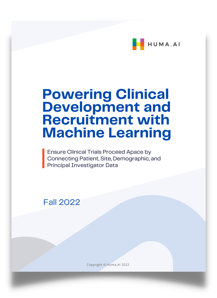Making the Most of the Data Available is the Key to Driving Recruitment
Clinical operations professionals must extract the information they need to make decisions about patient recruitment.
Data scientists and clinical development professionals can collaborate to improve patient recruitment with Machine Learning (ML). By collaborating on developing predictive models, collecting data in new ways, or working on new technologies to match patients with trials, these two groups can have a significant impact by working in tandem.

According to a 2022 review published in Frontiers in Public Health, “Patient recruitment is one of the most challenging steps in clinical trials, but by applying artificial intelligence (AI), researchers could significantly improve efficacy and safety while reducing costs.”
Fortunately, there are at least three ways to jumpstart patient recruitment for clinical trials using Machine Learning (ML).
#1. Identify Patterns in Existing Trial Data
One approach is to use ML to identify patterns in existing trial data. This allows clinical development professionals to quickly get a glimpse into how patient recruitment and retention may be impacted by various factors, such as amendments to protocols or unexpected challenges due to stringent inclusion criteria.
By using ML, professionals in clinical development can quickly identify trends and patterns that can inform the design of future trials.
With this information in hand, these professionals can more effectively plan and execute their clinical trials, tailoring them better to suit the needs of both patients and researchers. They can also identify potential risks and challenges well in advance, allowing them to address any issues that may arise proactively.
According to Frontiers in Oncology, "Challenges in subject enrollment and matching cause extension of enrollment deadlines delay the submission of the trial protocols for regulatory approvals and subsequently cause a deferment of the product launch beyond the initially planned dates."
Optimizing the use of existing data in trial design is beneficial for patient recruitment and can accelerate drug development timelines, saving millions.
#2. Develop Predictive Modeling to Inform Decisions
Another option is for clinical operations professionals to work closely with data scientists to develop predictive models to help inform their recruitment and enrollment decisions.
A study of 114 trials in the UK indicated that only 31% met enrollment goals, according to the journal Contemporary Clinical Trials Communications.
By leveraging advanced statistical techniques and ML, models can provide accurate predictions about factors like patient response rates or drop-out rates, allowing clinical development teams to identify potential obstacles and take proactive steps to address them.
Furthermore, predictive modeling can also facilitate collaboration between clinical development and data science teams by providing them with a common set of metrics that they can use to inform their decision-making processes. By working together to identify key trends or patterns within this data, both teams can more effectively identify areas for improvement or target new research opportunities that may lead to breakthroughs in patient care.
This collaborative approach has the potential to transform clinical development and pave the way for even greater advancements in healthcare in the years ahead.
#3. Leverage a Clinical Trial Matching System
In Summary
According to Trials, “To the extent that ML-enabled clinical research can improve the efficiency and quality of biomedical evidence, it may save human lives and reduce human suffering, introducing an ethical imperative to explore this possibility."
There are many ways that data scientists and clinical development professionals can work together to improve patient recruitment. By making more of the data at hand, collaborating on predictive modeling, or working together on innovative new technologies for matching patients with trials, data scientists and clinical development professionals can help transform the way trials are designed and conducted, making a positive impact on the lives of those who need trials the most.
Deeper Insights for Clinical Trials
Finding the sites and principal investigators to conduct trials is no small task.
With Huma.AI, a single intelligence layer is placed over a wide variety of data sets pulled from almost any source. Huma.AI can uncover deeply buried clinical trial insights that give clinical professionals the highly targeted intelligence and market advantage needed to create more successful trials.
Book a free demo to see how Huma.AI can boost your clinical intelligence.
.png?width=300&height=120&name=Huma-AI-Logo-(Horizontal).png)



.png?width=200&name=Huma-AI-Logo-(Horizontal-Reverse).png)